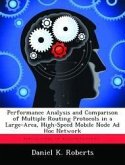Although wireless communication provides connectivity where hardwired links are difficult or impractical, it is still hindered by the environmental conditions where the communicators reside. An alternative solution is to create a Mobile Agent Relay Network (MARN). Each autonomous node in the MARN decides where to move to maintain the network connectivity using only locally-available information from onboard sensors and communication with in-range neighbor nodes. This thesis takes the first steps toward realizing a MARN by providing mobile relay agents. Each model-based reflex agent is guided by a modified flocking behavior which considers only trustworthy neighbors and uses a Bayesian model to aggregate observations and shared reputation. The relay agents are able to build a network and maintain connectivity for their users. In this work, MARN agent algorithms are evaluated in a simulated unobstructed environment with stationary users. The system behavior is explored under both benign conditions and with varying numbers of misbehaving nodes.
Hinweis: Dieser Artikel kann nur an eine deutsche Lieferadresse ausgeliefert werden.
Hinweis: Dieser Artikel kann nur an eine deutsche Lieferadresse ausgeliefert werden.








